SAN DIEGO: Severe weather events across the Middle East are becoming increasingly common, but advanced data-collection technology is now being used to mitigate these effects on cities today and hopefully in the future.
According to the website Statista.com, flooding between 2013 and 2023 resulted in economic insured losses of an estimated $98.2 billion.
The report goes on to say that 2021 was the year with the highest insured losses caused by flooding events during that decade at $24.2 billion.
The human cost alone is of concern. In 2021 the World Economic Forum reported that storms had claimed over 577,000 lives, and almost 59,000 people died in floods.
In April, 142 mm of rain fell on the UAE in 24 hours — the same amount usually over a year-and-a-half, and the heaviest in 75 years.
Five people reportedly died in the storms that also flooded homes, malls, streets and even Dubai’s busy international airport. The country was brought to a standstill as cars were submerged.
According to Naji Atallah, head of construction and manufacturing, EMEA Emerging markets at Autodesk, such weather is going to become more frequent as climate change continues.
But as more information is gathered on such events then more can be done to reduce the impact, and in some cases turn these events into an advantage.
Speaking on the sidelines of the recent Autodesk University 2024: The Design and Make Conference in San Diego, US, Atallah told Arab News that incidents such as flash floods can be prevented, or the impact at least reduced if a large amount of data is available.
“Floods, more intense rainfall, or more intense droughts are becoming more frequent,” he explained. “So a city that designed its infrastructure for a one-in-100-year storm will be capable of coping with a probability of 1 percent. for a storm of that magnitude.”
But he said there was now a greater frequency to these major weather events. So a storm that would have previously occurred once every 100 years, is now likely to occur once every 10 years, making the need for improvements much more necessary.
“At some point there will be a storm event that’s beyond the capacity of that design and then flooding will occur. So, the intention should be to make the flood events predictable and manageable.”
He said there are currently cities in the Middle East using software to help design drainage systems and prioritize areas that need intervention when flooding occurs.
Atallah said that rapid urbanization was contributing to increased flooding because it has reduced drainage areas.
Information remains key, he said.
“It is all about data,” Atallah explained. “These models are extremely rich in data, which means you can simulate different scenarios and how the water will behave, where it will go.”
In cities such as Dubai, where fleets of tankers are used for drainage, there can be better predictions of high-risk areas and therefore the deployment of these vehicles.
In addition, Atallah said scenario-mapping can help determine where to create channels and storage areas where flash floods are most likely — basically creating lakes or reservoirs.
This is especially important in areas such as the Gulf region, he said, as water is high in demand but low in supply.
He said cities in the UAE and Saudi Arabia are already working on projects to counter future weather events. This includes Jeddah, which is particularly flood-prone.
Atallah said there was still a lot to be learned.
And he hopes the advancements in technology, including artificial intelligence, would help mitigate the effects of major weather events detrimental to human habitats.



























